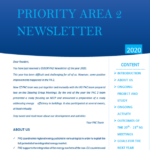Opportunities of the European Green Deal and the EU macro-regional strategies – 21-22 September
All four existing MRS are addressing environmental challenges assuring cooperation to deal with floods, pollution in the sea or securing biodiversity and sustainable use of resources. Furthermore, by bringing regions together, the EU macro-regional strategies help to build links between innovation ecosystems and explore the best ways for cooperation and more efficient use of resources. However, the potential of Strategies is not yet fully exploited. Cooperation is crucial to deliver European Green Deal, even more in times when the whole of Europe is trying to recover from an economic crisis caused by the outbreak of COVID-19 in early 2020. That is the reason why the EU Strategy for the Adriatic and Ionian Region together with Interact organized an online workshop on 21-22 September.
At the meeting MRS thematic coordinators, Commission as well as environmental experts were present to kick off the debate on how to best use the framework provided by MRS to achieve objectives and ambitions set by the European Green Deal. It focused on the topic “Ecological corridors to prevent genetic isolation (Blue and Green infrastructure)” discussing it in a scope of European Green Deal and EU Biodiversity Strategy for 2030, keeping biodiversity and economic recovery in the centre of the talk.
V4Green Universities kick-off meeting – 22 September
The V4Green Universities project is financed by the Visegrad Grants from International Visegrad Fund. The project is supported by the Hungarian Coordination of PA2. The total budget is 32 400 EUR and it runs between 01/03/2020 and 31/08/2021. The project aims at support the fight against climate change by awareness raising. The project partners are engaged member universities of the worldwide network of UI GreenMetric World University Ranking [https://greenmetric.ui.ac.id], which calls the attention on global climate change, the importance of energy and water conservation, waste recycling, and green transportation. Together with University of Pécs, the following partners take part in the implementation: Czech University of Life Sciences Prague, The Slovak University of Agriculture in Nitra, University of Kragujevac (Serbia), Ukrainian National Forestry University. The kick-off held on 22 September strived to introduce efficient, practical climate protection interventions of the participating five countries.
See more at https://zoldegyetem.pte.hu/en/v4gu/
DanuP-2-Gas kick-off meeting – 30 September
EUSDR PA2 coordination, as an Associated Strategic Partner, participated at the online kick-off meeting of DanuP-2-Gas project, supported by the Danube Transnational Programme. In line with the EU climate targets for 2030 and the EUSDR PA2 goals DanuP-2-Gas will advance transnational energy planning by promoting generation and storage strategies for renewables in the Danube Region by coupling the electric power and gas sector. Based on the platform developed during DTP project ENERGY BARGE it will incorporate all pre-existing tools and i.a. an Atlas, mapping prior unexamined available biomass and energy infrastructure. Further, a pre-feasibility study utilizing an optimization tool for efficient hub design will identify suitable locations for sectors coupling hubs and combination of two idle resources in the Danube region. Unused organic residue (e.g. straw) will be processed to biochar for easy transport along the Danube River and as basis for synthesis gas generation. Adding hydrogen produced from surplus renewable energy allows to upgrade this syngas to renewable natural gas. This will enable storage of surplus energy in the existing gas distribution grid increasing energy security and efficiency.
For more information visit at http://www.interreg-danube.eu/approved-projects/danup-2-gas
Budapest Climate Summit – 9 October
Budapest Climate Summit is organized under the Honorary Patronage of Mr László Palkovics, Hungarian Minister for Innovation and Technology. The summit is focusing on the green transition of the Central and Eastern Europe region’s economy and brings together policy makers, industry experts, corporate leaders, technology pioneers and next generation sustainable leaders to share their perspectives on how to enable businesses and the civil society to deliver actions necessary to achieve climate objectives.
The presentations and the panel discussions adressed the most important and relevant challenges of the sustainable future presented by the most prominent representatives of the certain topic. The four discussions were able to make us understand how difficult is to see through all the challenges and interests of the affected sectors:
- panel: Corporate stakeholders from a variety of sectors discussed the challenges and opportunities of implementing green strategies to achieve a more sustainable business model.
- panel: The other important topic of the day was the future of transportation. The experts discussed how can we manage to reduce the harmful environmental impacts of the transportation sector which accounts for almost one-third of the European carbon emissions.
- panel: Experts from the financial sector discussed the role of sustainable investments in accelerating the green transition and climate change mitigation.
- panel: On their way to developing a smart city ecosystem, city leaders share their experience and insights on the transformation of urban areas with sustainable solutions in local mobility; integrated infrastructure; logistics and public services.
All the presentations are available on the following link: https://budapestclimatesummit.com/
PlanUp webinar – 14-15 October
The NECPs and post-covid recovery plans: what are the main takeaways in the buildings and transport sectors
PlanUp tracks the development of National Energy & Climate Plans in five EU Member States: Spain, Italy, Poland, Romania and Hungary. To support rapid decarbonisation in Europe the project promotes good practices in the transport, agriculture and building sector and fosters dialogue on low-carbon policymaking between local, regional and national authorities, civil society organizations and academia.
At the webinar the overall assessment of the NECP of the 5 participating countries were presented. The main finding is that there were some improvement in the final NECPs compared to the drafts but still there has to be more done to reach the EU targets.
Concerning the transport sector, the main conclusions are that EU laws provide the main driver of development, but national measures are also essential, such as budget and taxation. Local measures are also important to change the citizens’ behavior.
The main barriers of the renovations of buildings were also presented at the event such as the underestimation of the importance of renovations from individual and societal point of view in energy saving and reduction of GHG emissions. Another problem is the lack of advice, lack of financing and lack of qualified experts. A long-term shared strategic vision is needed in the building sector, it is also necessary for investors and constructors.
In the transport field, the main barriers of implementation of best practices in transport in Hungary were presented. The Hungarian NECP is week in this aspect, the main topic is electrification. A lot of subsidies are allocated but they are not always well used. The real transition is hindered by the strong presence of car manufacturer companies and big oil companies in the country.
During the meeting an overview on the EU Recovery Plan was also provided, presenting the main future available EU financial resources as well as the expected timelines to boost ecological transudations.
This was followed by the presentation of case studies. A case study from the building sector in Italy summarized first the main challenges for building renovation in Italy (rising energy consumption of buildings with impacts of growing pollution and GHG emission, as well as the significance of energy poverty impacting more than 2 million families). Moreover the largest share of housing was built between 1946 and 1990 with no standards on energy performance of buildings. Then the different policies for renovation of buildings were introduced, like various tax deductions. The limits of these measures were also discussed, which include the push to install gas boilers, lack of proper measures to handle energy poverty, the lack of integrated approaches.
The other presented case study focused on transport in Spain. First Spain’s strategic framework was presented (NECP, Climate change and energy transition law, Long-term decarbonisation strategy, Mobility strategy, etc.) and their main targets. Afterwards a few transport and mobility related good examples were presented from Spain’s Recovery Transformation and Resilience Plan, like establishment of low-emission zones in metropolitan environments with promoting electric vehicles especially in the public transport.
This section was followed by a presentation from the European Environmental Bureau, who raised the attention on some shortcomings of the recently launched EU Renovation Wave Strategy, which promises new financial incentives, targets and measures to renovate old, energy-guzzling buildings across Europe. These missing elements include the lack of fossil-fuel phase out target or pathway (80% of Europe’s heating is being generated by fossil fuels, mainly gas) and the lack of tackling embodied emissions in buildings. This latter one is also largely overlooked in the NECP-s. The speaker emphasized the importance of fossil-fuel phase out in the heating and cooling sector.
UNECE online capacity building workshop on sustainable renewable energy investment and deployment – 19 October
The workshop was addressing the presented topics from the perspective of the Water-Food-Energy-Ecosystems nexus, thus gave a holistic overview.
First the Water Convention was briefly presented. It was emphasized that it supports transnational cooperation with “silos thinking” (reduced friction between countries and sectors), co-optimizing the use of existing and new infrastructures, as well as motivating information sharing and consultation in a transboundary context.
The Parties to the Water Convention have established a Task Force on the Water-Food-Energy-Ecosystems Nexus to oversee nexus assessments of natural resource management in shared water basins. The presentation introduced the Transboundary Basin Nexus Assessment (TBNA) methodology, which was developed specifically for the purpose of transboundary assessments exploring intersectoral challenges as well as opportunities that arise from closer cooperation on natural resource management across sectors and countries. So far, the methodology has been applied to six transboundary river basins and one shared groundwater aquifer, including the Sava river area (Bosnia and Herzegovina, Croatia, Montenegro, Serbia, and Slovenia). The presentation also introduced the concept of 3 parallel tracks of sustainable renewable energy deployment: (1) Strategic RE planning, (2) Sustainable RE policy, and (3) Sustainable RE projects. The concluding remarks emphasized that RE deployment with water and environment benefits can effectively deliver on climate action (mitigation + adaption), however action is needed at many levels, coherence and synergy between different policies, stakeholders are necessary. Inclusive and effective oublic participation is crucial.
The presentation was followed by a panel discussion with experts from the UNECE Group of xperts on Renewable Energy, as well as panelists from Serbia, Ukraine, Georgia, Kyrgizstan, Tajikistan and Kazahstan.



